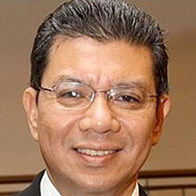On September 4, 2014, the National Young Lawyers Committee of the Bar Council (NYLC) launched a campaign to repeal the Sedition Act 1948 (Act). The campaign is known as #MansuhAktaHasutan (#RepealSeditionAct).
I was honoured to be invited to speak at the launch of the campaign together with Christopher Leong (President, Malaysian Bar) and Datuk Ambiga Sreenevasan (Past President, Malaysian Bar).
The Act, which was introduced by the British colonial, was aimed at punishing those who opposed the British and the Federation of Malaya. Unfortunately, the Act is still in force even though Malaysia has gained independence from the British in 1957.
It is also unfortunate that it is still in force after Prime Minister Datuk Seri Mohd Najib Tun Abdul Razak has embarked on a political transformation process, for example, abolishment of the Emergency Ordinance and the Internal Security Act and allowing university students to participate in politics by amending the University and University College Act (UUCA).
The problems with the Act are, firstly, the definition on what is a seditious tendency in not required (PP v Fan Yew Teng, 1975 and PP v Oh Keng Seng, 1979). Secondly, the intention of the accused when he made the speech is not relevant or immaterial (PP v Oh Keng Seng, 1979, and PP v Mark Koding, 1983). Thirdly, the prosecution does not need to prove that the speech has caused actual harm or disturbance (PP v Mark Koding, 1983). And fourthly, the prosecution only need to prove that the accused did utter the impugned words.
It is therefore clear that the threshold to be found guilty under this Act is too low. The Act restricts freedom of speech and expression, and with the charge against Associate Professor Dr Azmi Sharom, recently, it also restricts academic freedom.
Besides that, there is also the growing concern that the Act has been abused through selective prosecution.
The Act is draconian. Hence, many lawyers, activists, academicians and politicians, and in particular, the Malaysian Bar, have long been calling for the Act to be repealed.
In July 2012, Prime Minister Datuk Seri Najib announced that the Government would repeal the Act. In July 2013, he reiterated the government’s intention to repeal the Act and replace it with a National Harmony Act.
But, many are expressing their surprise and anxiety because of the sudden increase of people being prosecuted under the Act lately, i.e. after the completion of the General Election 13 (GE13). They are Karpal Singh, Tian Chua, Teresa Kok, Abdullah Zaik Abdul Rahman, N. Surendran, Khalid Samad and R.S.N. Rayer.
The anxiety became more intense when on September 2, 2014, a Universiti Malaya law lecturer, Dr Azmi Sharom was charged under the Act for his legal opinion on the current Selangor Chief Minister’s crisis.
I support the call to repeal the Act. Besides that, as a member of the National Unity Consultative Council (NUCC) Law and Policy Committee, I am also a party to the proposal that the Act is replaced with a new law, for example, the National Harmony Act.
The objectives of the proposed National Harmony Act are: to criminalise hate speech made on grounds of race, religion and incitement against the Rulers; introduce the elements of intention and harm; to promote equality and prohibits unfair discrimination; to set up a commission to promote unity and provides for mediation of conflict and adjudication of conflict if mediation fails.
At the same time, the proposed new law seeks to uphold freedom of speech and expression and academic freedom. It will also be consistent and shall not derogate from fundamental provisions of the Federal Constitution, for example, Article 3, 152, 153, 181 and Part III.
This campaign is important because there are people who are against the repealing of the Act. Their argumentations are not substantive. The campaign can help enhance their comprehension on the issue.
And given the recent developments, there is a need to show to the government that there is a growing number of people who want the Act be repealed as soon as possible. Hence, the need for the campaign.
According to campaign director Syahredzan Johan, the objectives and demands of the campaign are: the federal government fulfil its promise to repeal the Act; all (current) prosecutions under the Act be dropped; not to replicate the Act in another legislation; promote awareness on why the Act must be repealed; and create a critical mass of the rakyat against the Act.
The campaign will involve activities, such as, distribution of brochures/leaflets containing frequently asked question about the Act, workshops and forums. The campaign will be taken nationwide and will work with all stakeholders.
The tangible end product of the campaign is a critical mass translated into expressions of support through the collection of signatures. The campaign is also available on line, for example, on twitter (#MansuhAktaHasutan).
The escalation of the recent charges under the Act looks like the government is cracking on dissent and no longer celebrate the contestation of ideas. This is a U-turn from the political transformation undertaken before GE13 which have given a lot of hopes on the path towards a mature democracy.
I believe the prime minister is committed to repeal the Act as part of his democratisation process. But, there may be people around him who is not on the same page. So, let’s show that the rakyat is with him. Let’s campaign! – September 12, 2014.
*This article first appeared in The Edge.
*This is the personal opinion of the writer or publication and does not necessarily represent the views of The Malaysian Insider.


Comments
Please refrain from nicknames or comments of a racist, sexist, personal, vulgar or derogatory nature, or you may risk being blocked from commenting in our website. We encourage commenters to use their real names as their username. As comments are moderated, they may not appear immediately or even on the same day you posted them. We also reserve the right to delete off-topic comments